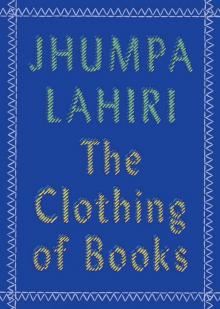- Home
- Jhumpa Lahiri
Unaccustomed Earth Page 18
Unaccustomed Earth Read online
Page 18
It was only after Sang hung up that she complained. How dare these men call? she’d say. How dare they hunt her down? It was a violation of her privacy, an insult to her adulthood. It was pathetic. If only Paul and Heather could hear them, going on about themselves. At this point, Heather would sometimes say, “God, Sang, I can’t believe you’re complaining. Dozens of men, successful men, possibly even handsome, want to marry you, sight unseen. And you expect us to feel sorry for you?” Heather, a law student at Boston College, had been bitterly single for five years. She told Sang the proposals were romantic, but Sang shook her head. “It’s not love.” In Sang’s opinion it was practically an arranged marriage. These men weren’t really interested in her. They were interested in a mythical creature created by an intricate chain of gossip, a web of wishful Indian-community thinking in which she was an aging, overlooked poster child for years of bharat natyam classes, perfect SATs. Had they any idea who she actually was and how she made a living, in spite of her test scores, which was by running a cash register and arranging paperback books in pyramid configurations, they would want nothing to do with her? “And besides,” she always reminded Paul and Heather, “I have a boyfriend.”
“You’re like Penelope,” Paul ventured one evening. He had lately been rereading Lattimore’s Homer, in preparation for his orals in English literature the following spring.
“Penelope?” She was standing at the microwave, heating some rice. Paul watched as she removed the plate and mixed the steaming rice with a spoonful of the dark red-hot lime pickle that lived next to his peanut butter in the door of the refrigerator.
“From the Odyssey?” Paul said gently, a question to match her question. He was tall without being lank, with solid fingers and calves, and fine straw-colored hair. The most noticeable aspect of his appearance was a pair of expensive designer glasses, their maroon frames perfectly round, which an attractive salesgirl in a frame shop on Beacon Street had talked him into buying. Paul had not liked the glasses, even as he was being fitted for them, and had not grown to like them since.
“Right, the Odyssey,” Sang said, sitting down at the table. “Penelope. Only I can’t knit.”
“Weave,” he said, correcting her. “It was a shroud Penelope kept weaving and unweaving, to ward off her suitors.”
Sang lifted a forkful of the rice to her lips, blowing on it so that it would cool. “Then, who’s the woman who knits?” she asked. She looked at Paul. “You would know.”
Paul paused, eager to impress her, but his mind had drawn a blank. He knew it was someone in Dickens, had the paperbacks up in his room. “Be right back,” he said. Then he stopped, relieved. “A Tale of Two Cities,” he told her. “Madame Defarge.”
Paul had answered the phone the first time Sang called, at nine o’clock one Saturday morning in July, in reference to the housemate ad he and Heather had placed in the Phoenix. The call had roused him from sleep, and he wondered, standing there, groggy in his bathrobe, what sort of name Sang was, half expecting a Japanese woman. It wasn’t until she wrote out a check for her security deposit at the end of her visit that he saw that her official name was Sangeeta Biswas. This was the name he would see on her mail, on the labels of the thick, pungent Vogue magazines she received each month, and in the window of the electric bill she agreed to take on. Heather had been in the shower when Sang arrived and pressed the doorbell that chimed two solemn tones, so Paul greeted her alone. She had worn her long hair loose, something Paul was to learn she rarely did, and as he walked behind her he had liked the way it clung protectively to her body, over the rise of her shoulder blades. She had admired the spectacular central staircase, as most everyone did, letting her hand linger over the bannister. The staircase turned six times at right angles after every six steps and was constructed of dark gleaming wood with the lustre of cognac. It was the only thing of enduring beauty in the house, a false promise of what was above: ugly brown cabinets in the kitchen, moldy bathrooms with missing tiles, omnipresent oatmeal carpeting to protect the ears of the landlords, who lived below.
She had remarked on what a lot of space it was, pacing the landing before joining Paul in the vacant room. There was a built-in hutch in the corner, with Doric pilasters and glass-paned doors, which Sang opened and closed. Paul told her that the room had originally been the dining room, the cabinet intended to store china. There was a bathroom across the landing; Paul and Heather shared the larger one, upstairs. “I feel like I’m standing inside an empty refrigerator,” she’d said, referring to the fact that the walls, once blue, had been painted over with a single coat of white; the effect, under the glare of the ceiling light, was stark and cold. She ran a hand along one wall and carefully removed a stray piece of tape. Once, there had been an arched doorway connecting the room to the kitchen, since filled in, but Sang noted that the arch was still visible, like a scar in the plaster.
While she was there, the phone rang, another person replying to the ad, but by then she had handed over her deposit. She had met Heather, and the three of them chatted in the living room with its peeling bay window and its soft filthy couch and its yellow papasan chair. They told her about their system for splitting up the chores, and about the landlords, both doctors at Brigham and Women’s. They told her there was only one phone jack in the house, in the kitchen. The phone was attached to a cord so long that they could all drag it to their rooms, though at times the price to pay for dragging the cord too far was a persistent crackle.
“We thought about having another line put in, but it’s pretty expensive,” Heather said.
“It’s not a big deal,” Sang said.
And Paul, who seldom spoke on the phone to anyone, said nothing at all.
She had practically nothing to contribute to the house, no pots or appliances, nothing for the kitchen apart from an ailing hanging plant that shed yellow heart-shaped leaves. A friend helped her move in one Sunday, a male friend who was not, Paul gathered, her boyfriend (for she had mentioned one on her first visit, telling them that he was in Cairo for the summer visiting his parents, that he was Egyptian, and that he taught Middle Eastern history at Harvard). The friend’s name was Charles. He wore high-top sneakers and a bright orange bowling shirt, his hair tied back in a stubby ponytail. He was telling Sang about a date he’d had the night before, as they unloaded a futon, two big battered suitcases, a series of shopping bags, and a few boxes from the back of a pickup truck. Paul had offered to help, calling out from the deck where he was trying to read the Canterbury Tales, but Sang said no, it was nothing. Their talk distracted him and yet he remained, watching Sang through the railing. Charles was teasingly forbidding her to buy too many things, so that moving out would be just as easy. Sang had been laughing at him, but now she stopped, her expression pensive. She looked up at the house, a balled-up comforter in her arms. “I don’t know, Charles. I don’t know how long I’ll be here.”
“He still doesn’t want to live together until you’re married?”
She shook her head.
“What does he say?”
“That he doesn’t want to spoil things.”
Charles shifted the weight of the box he was carrying. “But he acknowledges the fact that you’re getting married.”
She turned back to the truck. “He says things like ‘When we have kids, we’ll buy a big house in Lexington.’”
“You’ve been together three years,” Charles said. “So he’s a little old-fashioned. That’s one of the things you like about him, right?”
The next few nights, Sang slept on the couch in the living room, her things stored temporarily in the corner, in order to paint her room. Both Paul and Heather were surprised by this; neither of them had made an effort to do much to their rooms when moving in. For the walls, she had chosen a soothing sage green; for the trim, the palest lavender, a color that the paint company called “mole.” It wasn’t what she imagined a mole to look like at all, she told Paul, stirring the can vigorously on the kitchen counter. “What
would you have named it?” she asked him suddenly. He could think of nothing. It was only upstairs, sitting alone at his big plywood desk, piled with thick books full of tissue-thin pages, that he thought of the ice cream his mother always ordered at Newport Creamery when his family went on Sunday nights for hamburgers. His mother had died years ago, his father soon after. They’d adopted Paul late in life, when they were in their fifties, so people had often mistaken them for his grandparents. That evening in the kitchen, when Sang walked in, Paul said, “Black raspberry.”
“What?”
“The paint.”
She had a small, slightly worried-looking smile on her face, a smile one might give a confused child. “That’s funny.”
“The name?”
“No. It’s just a little funny the way you picked up a conversation we had, like, six hours ago, and expected me to remember what you were talking about.”
As soon as Paul opened the door of his room the next morning, he detected the fresh yet cloying smell of paint, heard the swish of the roller as it moved up and down a wall. After Heather had left the house, Sang started to play music: one Billie Holiday CD after another. They were having a spell of sticky, sweltering days, and Paul was working in the relative cool of the living room, a few paces across the landing from Sang.
“Oh, my God,” she exclaimed, noticing him on her way to the bathroom. “This music must be driving you crazy.” She wore cutoff jeans, a black tank top with straps like those of a brassiere. Her feet were bare, her calves and thighs flecked with paint.
He lied, telling her he often studied to music. Because he noticed it was the kitchen she went to most often, to rinse her brushes or eat some yogurt out of a big tub, the second day he moved himself there, where he made a pot of tea, and, much to her amusement, set the alarm on his wristwatch to know when to take out the leaves. In the afternoon, her sister called, from London, with a voice identical to Sang’s. For a moment, Paul actually believed it was Sang herself, mysteriously calling him from her room. “Can’t talk, I’m painting my room sage and mole,” she reported cheerfully to her sister, and when she replaced the receiver of the dark brown phone there were a few of her mole-colored fingerprints on the surface.
He liked studying in her fleeting company. She was impressed with how far he’d got on his PhD—she told him that after she dropped out of Harvard a year ago, her mother locked herself up in her bedroom for a week and her father refused to speak to her. She’d had it with academia, hated how competitive it was, how monkish it forced one to become. That was what her boyfriend did, always blocking off chunks of his day and working at home with the phone unplugged, writing papers for the next conference. “You’ll be good at it,” she assured Paul. “You’re devoted, I can tell.” When she asked him what his exam entailed, he told her it would last three hours, that there would be three questioners, and that it would cover three centuries of English and European literature.
“And they can ask you anything?” she wanted to know.
“Within reason.”
“Wow.”
He didn’t tell her the truth—that he’d already taken the exam the year before and failed. His committee and a handful of students were the only ones who knew, and it was to avoid them that Paul preferred to stay at home now. He had failed not because he wasn’t prepared but because his mind had betrayed him that bright May morning, inexplicably cramped like a stubborn muscle that curled his foot during sleep. For five harrowing minutes, as the professors stared at him with their legal pads full of questions, as trains came and went along Commonwealth Avenue, he had not been able to reply to the first question, about comic villainy in Richard III. He had read the play so many times he could picture each scene, not as it might be performed on a stage but, rather, as the pale printed columns in his Pelican Shakespeare. He felt himself go crimson; it was the nightmare he had been having for months before the exam. His interrogators were patient, tried another question, which he stammered miserably through, pausing in the middle of a thought and unable to continue, until, finally, one of the professors, white hair like a snowy wreath around his otherwise naked head, put out a hand, as might a policeman stopping traffic, and said, “The candidate’s simply not ready.” Paul had walked home, the tie he’d bought for the occasion stuffed into his pocket, and for a week he had not left the house. When he returned to campus, he was ten pounds thinner, and the department secretary asked him if he’d fallen in love.
Sang had been living with them for a week when a suitor called. By then, the painting was finished, the dreary room transformed. She was removing masking tape from the edges of the windowpanes when Paul told her someone named Asim Bhattacharya was calling from Geneva. “Tell him I’m not in,” she said, without hesitating. He wrote down the name, spelled out carefully by the caller, who had said before hanging up, “Just tell her it’s Pinkoo.”
More men called. One asked Paul, dejectedly, if he was Sang’s boyfriend. The mere possibility, articulated by a stranger, jolted him. Such a thing had happened once before in the house, the first year Paul lived there—two housemates had fallen in love, had moved out in order to marry each other. “No,” he told the caller. “I’m just her housemate.” Nevertheless, for the rest of the day he felt burdened by the question, worried that he’d transgressed somehow simply by answering the phone. A few days later, he told Sang. She laughed. “He’s probably horrified now, knowing that I live with a man,” she said. “Next time,” she advised him, “say yes.”
A week afterward, the three of them were in the kitchen, Heather filling a thermos with echinacea tea because she had come down with a cold and had to spend all day in classes, Sang hunched over the newspaper and coffee. The night before, she had locked herself up in her bathroom, and now there were some reddish highlights in her hair. When the phone rang and Paul picked up, he assumed it was another suitor on the line, for, like many of Sang’s suitors, the caller had a slight foreign accent, though this one was more refined than awkward. The only difference was that instead of asking for Sangeeta he asked to speak to Sang. When Paul asked who was calling, he said, in a slightly impatient way, “I am her boyfriend.” The words landed in Paul’s chest like the dull yet painful taps of a doctor’s instrument. He saw that Sang was looking up at him expectantly, her chair already partly pushed back from the table.
“For me?”
He nodded, and Sang took the phone into her room.
“Boyfriend,” Paul reported to Heather.
“What’s his name?”
Paul shrugged. “Didn’t say.”
“Well, she must be happy as a clam,” Heather remarked with some asperity, screwing the lid onto her thermos.
Paul felt sorry for Heather, with her red, chapped nose and her thick-waisted body, but more than that he felt protective of Sang. “What do you mean?” he said.
“Because her lover’s back, and now she can tell all those other guys to fuck off.”
The boyfriend was standing on the sidewalk with Sang, looking up at the house, as Paul returned on his bike from a day of photocopying at the library. A bottle-green BMW was parked at the curb. The couple stood with an assumed intimacy, their dark heads tilting toward each other.
“Keep away from the window when you change your clothes,” Paul heard him say. “I can see through the curtain. Couldn’t you get a room at the back?” Paul stepped off his bike at a slight distance from them, adjusted the straps of his backpack. He was uncomfortably aware that he was shabbily dressed—in shorts, and Birkenstocks, and an old Dartmouth T-shirt, his pale legs covered with matted blond hair. The boyfriend wore perfectly fitted faded jeans, a white shirt, a navy-blue blazer, and brown leather shoes. His sharp features commanded admiration without being imposing. His hair, in contrast, was on the long side, framing his face in a lavish, unexpected style. He looked several years older than Sang, Paul decided, but in certain ways he strongly resembled her, for they shared the same height, the same gilded complexion, the same sprinkle
of moles above and below their lips. As Paul walked toward them, Sang’s boyfriend was still inspecting the house, searching the yellow-and-ochre Victorian facade as if for defects, until he looked away suddenly, distracted by the bark of a dog.
“Your roommates have a dog?” the boyfriend asked. He took an odd, dancelike step to the left, moving partly behind Sang.
“No, silly,” Sang said teasingly, running her hand down the back of his head. “No dogs, no smokers. Those were the only listings I called, because of you.” The barking stopped, and the ensuing silence seemed to punctuate her words. There was a necklace around her neck, lapis beads she now fingered in a way that made Paul think they were a gift. “Paul, this is Farouk. Farouk’s afraid of dogs.” She kissed Farouk on the cheek.
“Freddy,” Farouk said, nodding rather than extending a hand, his words directed more to Sang than to Paul. She shook her head.
“For the millionth time, I’m not calling you Freddy.”
Farouk glanced at her without humor. “Why not? You expect people to call you Sang.”
She was unbothered. “That’s different. That’s actually a part of my name.”
“Well, I’m Paul, and that’s pretty much all you can call me,” Paul said. No one laughed.
Suddenly, she was never at home. When she was, she stayed in her room, often on the phone, the door shut. By dinner, she tended to be gone. The items on her shelf of the refrigerator, the big tubs of yogurt and the crackers and the tabouli, sat untouched. The yogurt eventually sported a mantle of green fuzz, setting off shrieks of disgust when Sang finally opened the lid. It was only natural, Paul told himself, for the two of them to want to be alone together. He was surprised to run into her one day in the small gourmet grocery in the neighborhood, her basket piled high with food she never brought back to the house, purple net bags of shallots, goat cheese in oil, meat wrapped in butcher paper. Because it was raining, Paul, who had his car with him, offered her a ride. She told him no thank you, and headed off to the T stop, a Harvard baseball cap on her head, hugging the grocery bag to her chest. He had no idea where Farouk lived; he pictured a beautiful house on Brattle Street, French doors and pretty molding.

 The Namesake
The Namesake Nobody's Business
Nobody's Business Interpreter of Maladies
Interpreter of Maladies Hell-Heaven
Hell-Heaven The Lowland
The Lowland Unaccustomed Earth
Unaccustomed Earth The Clothing of Books
The Clothing of Books In Other Words
In Other Words The Penguin Book of Italian Short Stories
The Penguin Book of Italian Short Stories